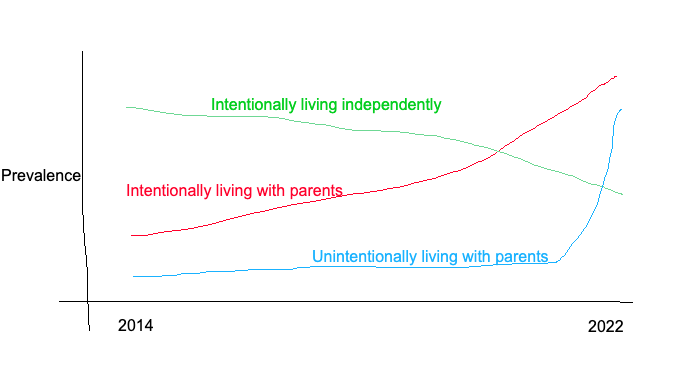Living with Parents Wasn’t the Plan after College

It was recently reported that half of 18-29 year old Americans are living with their parents.

For young recent college graduates, I can imagine three predominant realities:
- Those who expected to and successfully find a job and start their adult lives in a new city after graduation, independent of their parents.
- Those who expected to find a job and start their adult lives after graduation, but unintentionally find themselves back in the parents’ home instead.
- Those who never expected to immediately start their adult lives independent of their parents, and are intentionally living with their parents again. They’re focusing on getting their feet underneath them before independently moving out, figuring out their careers, interests, and more first.
While these three realities aren’t unique to recent times, I believe the prevalence of each one is greatly shifting right.

- The number of college graduates in their 20s who are intentionally living independently is on the decline, as exhibited by the inverse of the graph above.
- The number of college graduates unintentionally living with their parents has likely spiked from 2019 to 2022 due to the Covid-19 pandemic, associated initial economic uncertainty, now economic deflation. Fewer jobs, increased rents, and expensive
- The number of college graduates intentionally living with their parents has been steadily climbing as rents and housing prices continue to outpace inflation and earnings. This doesn’t meant they’re happy about it, but they
I think it’s important to recognize that the experience of college graduates living at home with their parents differs depending on whether or not they expected to be doing so.
- Those unintentionally living with their parents face more shock and may have greater struggles with deciding what to do next, their own self-worth, and more. These people are not to blame for the Covid-19 pandemic or any of the economic shifts that ensued, but they’re now finding their independent adulthood delayed by factors outside of their control.
- Those intentionally living with their parents face less shock due to gradually increasing costs of living, but may generally have a more bleak outlook on their ability to become independent and fully transition into their adult lives. They may have greater struggles accepting and planning around this “new normal” of delayed independent adulthood.
As I coach people across all three of these buckets, being cognizant of these distinct realities has given me greater ability to empathize and improved the relevance of the questions and exercises I use.
Enjoy our blog?
Forward to a friend and let them know they can subscribe (hint: it's here).
Have requests or feedback? Hit reply to suggest topics, send feedback or say hello.
Feeling mediocre or directionless? Explore our "Inner Compass Building" protocol that helps ambitious people build internal conviction, make urgent decisions, and minimize regret.